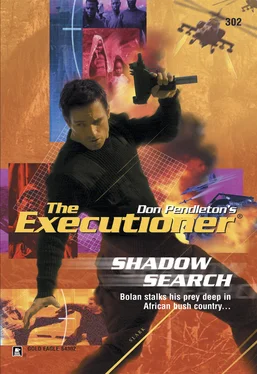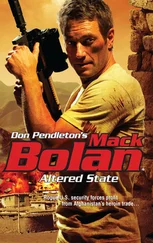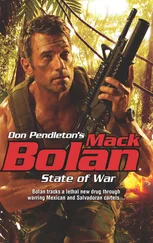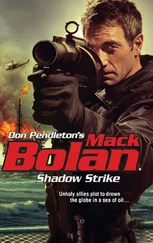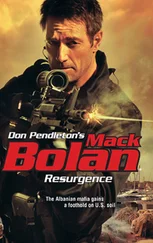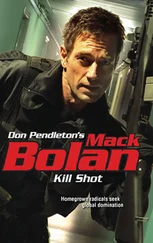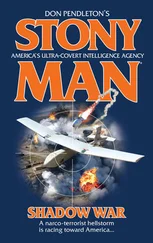Damned if he did, damned if he didn’t, Bolan thought.
Bolan sympathized with Karima. The man might have been the commander-in-chief of Tempala, but that didn’t render him immune from treachery. Most likely it made him all the more vulnerable. Being in the seat of power placed the man at risk from enemies both inside and outside his sphere of influence.
“I can understand your position, sir.”
Karima inclined his head, eyes searching Bolan’s face. “Your words suggest you are speaking from experience of betrayal yourself, Mr. Belasko.”
“That’s another story, sir.” Bolan dismissed the subject. “I take it that because you felt exposed and unsure who to trust you decided to ask my President for help?”
“Yes. I traded on our friendship.”
“Nothing wrong with that, sir.”
“I had to go beyond my own people. A sad indictment of my trust but the way things are I had no other options. We have two tribes, Mr. Belasko, the Tempai and the Kirandi. Centuries of opposition between us. The difficulty is that not all the present-day Kirandi harbor this old tribal culture. They see the world through modern eyes. We have moved on. The Kirandi of today have pushed aside the old ways. Tempai and Kirandi have merged. We all want a new Tempala, free from superstition, looking to the future. If we don’t we will all pay the price.”
“But not everyone feels that way?”
“Not everyone,” he agreed. “Hence our rebel faction.”
Karima leaned back, his eyes wandering back and forth across the room. It took him a moment or two to regain his composure.
“Mr. Belasko, how did I fall into this situation?”
“I’d guess you have more than enough on your mind. A lot to handle. It makes you vulnerable. And that is exactly what these terrorists will use to their advantage.”
Karima took a deep breath.
“Mr. President, I make no apologies for calling them terrorists. Terrorists attempt to achieve their aims by using the tactics of coercion. Threats. Humiliation of their victims. They terrorize and hope to get what they want by those means.”
“My children are everything to me. Always precious but even more so after my wife died. Our children are the future, Mr. Belasko. Why else do we struggle to build a better world? But it angers me that these damned people use them to force me to make Tempala take a step into the past.
“Tempala is not a particularly sophisticated country, Mr. Belasko. We don’t yet have the high tech capability of the U.S.A. My security organization is basic. Even our armed forces operate on a simple level. Just men and weapons. Our mechanization runs to trucks, some artillery and a few light tanks. We have no air force to speak of. No satellite communications. In time we may improve but until then we will have to make do with what we can afford. This is why the copper mining is so vital. The contracts will bring in a great deal of revenue, which we need.”
Karima stared through the window, watching the people moving about in the square.
“Money will help to improve many things. Hospitals and education. We will be able to upgrade our utilities. More power stations to create electricity. They may seem like simple things to someone from America, but here they are necessities.
“There is a great deal to do, Mr. Belasko. Now it is all under threat from these reb—” Karima turned abruptly. “On second thought, I believe your description is more suitable. Terrorists. They are putting the future of the country at risk.”
“These people will use anything to have their demands met. Which is why we can’t let them get away with it.”
“I feel the same. I refuse to bend to their demands. But then I look at the other side of the coin. How can I risk the lives of my children? Which way do I go? Hold on to my promise to the nation at the risk of losing my children?”
“Not an enviable position to be in, sir, but we’re not going to allow it to happen, are we?”
“Are we not, Mr. Belasko?” Karima asked, more in hope than conviction. “God, how I want it to be so.”
“Then let’s see what we can do to put things right,” Bolan said.
“Tell me what you need to know.”
“First, who knows why I’m here apart from yourself, McReady and his superior?”
“To the rest of my staff you are simply here as an addition to Cartwright’s team. You are a security advisor. I have tried to keep the children’s disappearance as low key as possible. But I don’t know how long I can keep on doing that.”
“What about vice-president Nkoya? Your military commander, Colonel Chakra? Do they know the real reason I’m here? And are they aware of the kidnapping?”
“They know nothing more than that you are part of the ambassador’s team. In answer to the second part of your question, yes they know about the kidnapping. But they are both under strict orders not to act until I make a decision one way or the other.”
“Okay, so let’s go back to my earlier question. Who knew enough about your children’s movements to be able to furnish the rebels with information?”
Karima considered his answer. He was troubled. Finally he pulled up a pad and picked up a pen. He scribbled across the pad, tore off the sheet and slid it across the desk. Bolan picked it up along with the file Karima had prepared for him.
“If anyone else knew they didn’t get the information from me, Mr. Belasko.”
“Thank you, sir. I’ll start from here.”
“If you need me, day or night, use the number I’ve written down. It’s my personal cell phone. I don’t give it out very often.”
Bolan stood, slipping the sheet of paper into his pocket. As he leaned forward his jacket fell open, exposing the holstered Beretta. Karima saw it, staring for a moment, then glanced at Bolan’s face.
“This really is your line of work, isn’t it, Mr. Belasko?” he asked.
Bolan closed his jacket. “We’re a long way from living in a peaceful world, Mr. President.”
“Meet the savage with his own image?”
Bolan smiled. “Something along those lines, sir.”
Reaching the door, Bolan turned the handle, then paused to look back over his shoulder. “One thing, sir. How did the terrorists contact you about your children?”
“I received a call on my—” Karima hesitated, the significance only then becoming a reality “—on my cell phone.”
Back in his hotel room Bolan tossed his jacket on a chair. He crossed to the small refrigerator and took a look inside. There were some bottles of water. He took one and opened it, taking a drink as he settled on the bed to read the file Karima had given him.
The information was scant, direct, and it only took a few minutes to digest. Karima’s children had been picked up from his home on the outskirts of the city to be driven to meet Karima. The drive should have taken no more than twenty minutes, but when an hour had gone by, the president received the phone call telling him that the children had been taken. He had ten days in which to carry out the terrorists’ demands. If he failed to do so the children would be killed and their bodies returned to him. The terrorists also demanded that news of the kidnap be kept from the media. As proof the kidnappers were serious, Karima was given instructions to check his garage at home. When he did he found his car had been returned, minus the children and with the driver’s body in the trunk. The man had been brutally knifed to death, his throat cut in a final gesture.
That had been two days ago. Enough time for the terrorists to travel a good distance from the scene of the kidnapping. Bolan considered the facts, and the more he thought about it the more he became convinced there was an inside connection. He opened the slip of paper Karima had given. There were only three names written on it. Karima had identified one of them as the driver of the car carrying the children. The second was Simon Chakra, whom Karima listed as his military commander. The last name, and Bolan had anticipated this, was Raymond Nkoya.
Читать дальше
